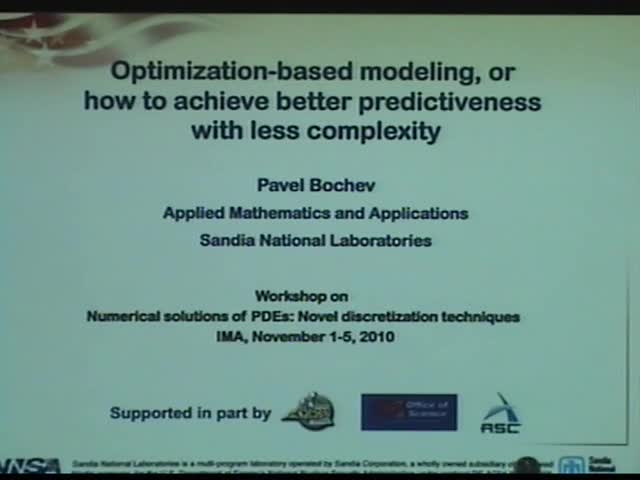Optimization-based computational modeling, or how to achieve better predictiveness with less complexity
Presenter
November 5, 2010
Keywords:
- Discretization
MSC:
- 70J50
Abstract
Discretization converts infinite dimensional mathematical models into finite dimensional algebraic equations that can be solved on a computer. This process is accompanied by unavoidable information losses which can degrade the predictiveness of the discrete equations.
Compatible and regularized discretizations control these losses directly by using suitable field representations and/or by modifications of the variational forms. Such methods excel in controlling "structural" information losses responsible for the stability and well-posedness of the discrete equations.
However, direct approaches become increasingly complex and restrictive for multi-physics problems comprising of fundamentally different mathematical models, and when used to control losses of "qualitative" properties such as maximum principles, positivity, monotonicity and local bounds preservation.
In this talk we show how optimization ideas can be used to control externally, and with greater flexibility, information losses which are difficult (or impractical) to manage directly in the discretization process. This allows us to improve predictiveness of computational models, increase robustness and accuracy of solvers, and enable efficient reuse of code. Two examples will be presented: an optimization-based framework for multi-physics coupling, and an optimization-based algorithm for constrained interpolation (remap). In the first case, our approach allows to synthesize a robust and efficient solver for a coupled multiphysics problem from simpler solvers for its constituent components. To illustrate the scope of the approach we derive such a solver for nearly hyperbolic PDEs from standard, off-the-shelf algebraic multigrid solvers, which by themselves cannot solve the original equations. The second example demonstrates how optimization ideas enable design of high-order conservative, monotone, bounds preserving remap and transport schemes which are linearity preserving on arbitrary unstructured grids, including grids with polyhedral and polygonal cells.
This is a joint work with D. Ridzal , G. Scovazzi (SNL) and M. Shashkov (LANL).
Sandia National Laboratories is a
multi-program laboratory operated by Sandia Corporation, a
wholly owned subsidiary of Lockheed Martin company, for the
U.S. Department of Energy's National Nuclear Security Administration under contract DE-AC04-94AL85000.
